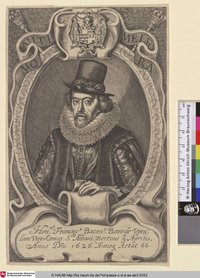
"Francis Bacon, 1st Viscount St Alban,[a] PC (/ˈbeɪkən/; 22 January 1561 – 9 April 1626), also known as Lord Verulam, was an English philosopher and statesman who served as Attorney General and as Lord Chancellor of England. His works are seen as contributing to the scientific method and remained influential through the later stages of the scientific revolution.
Bacon has been called the father of empiricism. He argued for the possibility of scientific knowledge based only upon inductive reasoning and careful observation of events in nature. Most importantly, he argued that science could be achieved by the use of a sceptical and methodical approach whereby scientists aim to avoid misleading themselves. Although his most specific proposals about such a method, the Baconian method, did not have long-lasting influence, the general idea of the importance and possibility of a sceptical methodology makes Bacon one of the later founders of the scientific method. His portion of the method based in scepticism was a new rhetorical and theoretical framework for science, whose practical details are still central to debates on science and methodology. He is famous for his role in the scientific revolution, begun during the Middle Ages, promoting scientific experimentation as a way of glorifying God and fulfilling scripture. He was renowned as a politician in Elizabethan England, as he held the office of Lord Chancellor." - (en.wikipedia.org 06.10.2022)
![[Sir Francis Bacon]](/data/nds/resources/images/202009/200w_000001-5f5860b02ce65.jpg)